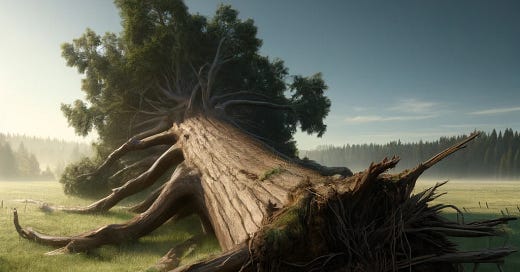At the death of a tree, Lu Zhaolin wants to choose life
And he did, until disease claimed him, too
A Hard Road to Walk Lu Zhaolin Sirs, do you not see? To the north of Chang’an, by the bridge on the Wei, Lies the withered husk of an ancient tree. In the past it bloomed with purple and red, Mist and smoke hung in its canopy. The breezes in spring brought down petals like snow, And opulent carriages clogged up the roads. Every visitor wanted to grasp at its twigs, What chanteuse wouldn’t take a bloom of her own? The maids with their belts and their dragon capes, The masters with silver harnesses rode In their thousands. Where orioles coyly flirted with flowers, And bluebirds with fledglings gracefully played, A thousand-foot timber and hundred-foot branches, Osmanthus and elm nestled in its shade. Its pillars and rafters gave elegant couples The homes where their phoenix-like young were laid. But when the boughs broke, the phoenixes left. Wood rotted; leaves fell; and the wild winds blew, The tree was forgotten, cast off overnight. To be lost for the ages, if my lords only knew What that might mean. Nobility, poverty—these do not last. They are moments in time that we cannot keep. No force stops the sun as it rolls to the west; Who could dam rivers that flow to the east? The forests of Han grow on lands that were Qin, Any spot you can walk, you’ll find cause to shed tears. We’re proud of our office and two thousand bushels, Can we hope that this glory lasts ten thousand years? Our red lips, white faces are swallowed in grey, The Yellow Springs turn them to thorns on the grave. Sometimes a mandarin’s mink cap of rank Must be sold to buy wine before we are lost; And sometimes a fly-whisk with handle of jade Should be wielded with pleasure, not counting the cost. To you lords of the Hall of Immortals, I say, We’ve sworn here a friendship in life and in death. But you’ll vanish from the Dragon King’s palace one day, And the White Crane will call me to my final rest. Will our loyal hearts meet again in the clouds On some isle in the ocean too distant to see? Who knows? When a king gave the throne to You and Chao They chose to withdraw; let us learn from them now, And step down to live lives in the quiet and peace That the sage-king provides for eternity! 卢照邻 行路难 君不见 长安城北渭桥边,枯木横槎卧古田。 昔日含红复含紫,常时留雾亦留烟。 春景春风花似雪,香车玉舆恒阗咽。 若个游人不竞攀,若个倡家不来折。 倡家宝袜蛟龙帔,公子银鞍千万骑。 黄莺一向花娇春,两两三三将子戏。 千尺长条百尺枝,丹桂青榆相蔽亏。 珊瑚叶上鸳鸯鸟,凤凰巢里雏鹓儿。 巢倾枝折凤归去,条枯叶落狂风吹。 一朝零落无人问,万古摧残君讵知。 人生贵贱无终始,倏忽须臾难久恃。 谁家能驻西山日,谁家能堰东流水。 汉家陵树满秦川,行来行去尽哀怜。 自昔公卿二千石,咸拟荣华一万年。 不见朱唇将白貌,惟闻素棘与黄泉。 金貂有时须换酒,玉麈但摇莫计钱。 寄言坐客神仙署,一生一死交情处。 苍龙阙下君不来,白鹤山前我应去。 云间海上邈难期,赤心会合在何时。 但愿尧年一百万,长作巢由也不辞。
Lu Zhaolin’s hard path was two-fold: the hard journey of life, and the difficult ascent up the greasy pole of Chang’an society. He suffered from a disease - perhaps arthritis - which first prevented him from working, and finally led him to kill himself by to escape the pain. Perhaps as a result of these harrowing experiences, this poem seems a little less self-satisfied than others which bear the same title.
Lu is still primarily concerned with the binary choice that faced officials in Chang’an: to serve or not to serve. This poem argues that life is short (even for trees), and pleasures must be taken where we can, so it would be better to quit your job and withdraw to private life.
Notes:
The Wei: The River Wei flows down through Gansu and past Xi’an.
Forests of Han, lands that were Qin: The Qin Dynasty first united China, but was quickly replaced by the Han Dynasty. Every single piece of land in the empire must have been “lost” or changed hands at some point. Of course, when Lu was writing in the early Tang Dynasty, every piece of land had changed hands several more times.
Two thousand bushels: The salary of a commandery governor.
Yellow Springs: One of the rivers that flows in the underworld.
Fly-whisk: Made with animal hair, on a handle. An object to be constantly kept in the hand; a jade one would be an impressive personal accoutrement.
Hall of Immortals: One of the government bureaus in Chang’an. This one was established by the empress Wu Zetian to be her personal talent pool.
Dragon King’s palace: Here refers to the imperial palace.
White Crane: Carries souls off when we die.
You and Chao: Xu You and Chao Fu were honourable men to whom the sage emperor Yao wanted to abdicate. They both refused (Yao would later successfully abdicate to Shun). Here, they are mentioned simply as examples of people who didn’t take the royal job.




Please! Don't use synthetic "art" from Dall-E. It makes your own work look cheap and I know that isn't true.
If you want low-cost or no-cost visuals, there are excellent images on Unsplash, https://unsplash.com/. Many are offered with a Creative Commons license that allows free use if authorship is acknowledged.